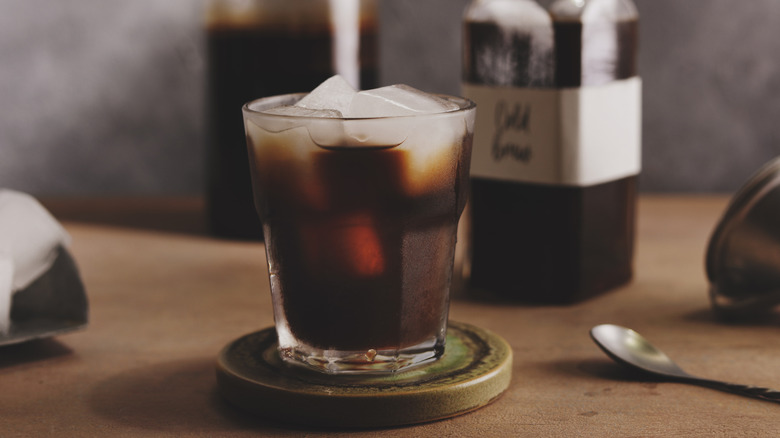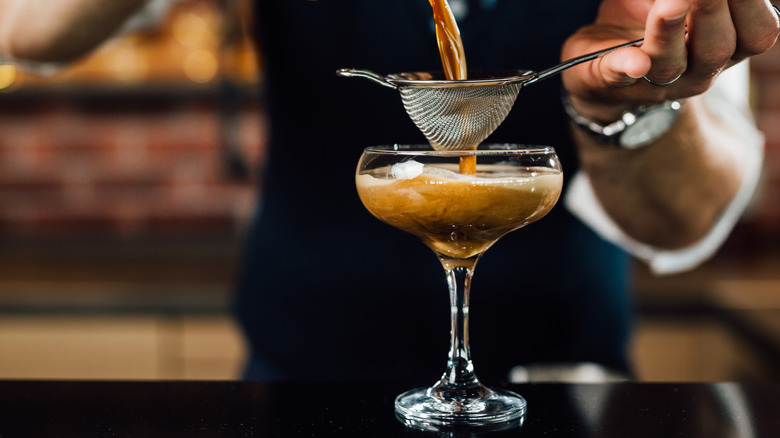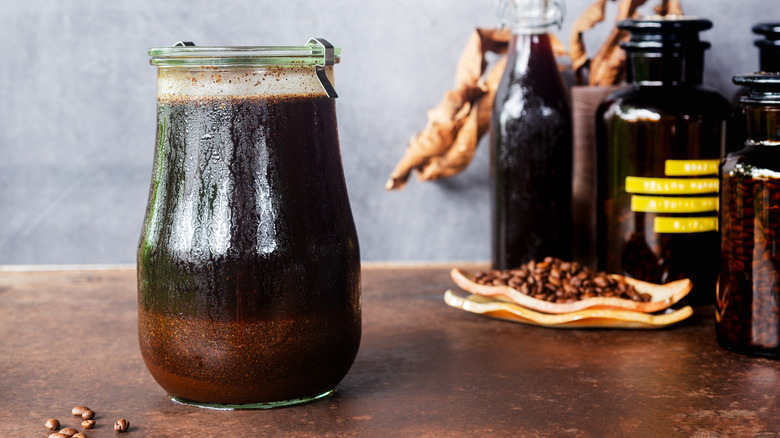Why Cold Brew Concentrate Is The Best Choice For Java Cocktails
The espresso martini might have had its moment in the sun, but the cocktail that defined the early 2020s has remained a staple on most cocktail lists. There's a good reason for that, of course. Liquor and coffee go together like bread and butter, albeit with a hell of a lot more punch. When you're mixing cocktails at home, though, it can be hard to find the right coffee for the job. Well, according to U.S. Barista Champion and co-founder of Onyx Coffee Lab, Andrea Allen, the answer is as simple as cold brew concentrate.
The last thing you want to do is water down your cocktail; and, even if you're lucky enough to have an at-home espresso machine, warming a cocktail up with a hot shot is only appropriate if you're making the historically cozy Irish coffee. While you can absolutely use instant coffee to great effect in espresso martinis and other boozy coffee concoctions, you need to find really good quality freeze dried beans and have the foresight to cool the prepped liquid ahead of time.
Solving for all of it, Allen explains, "A concentrated cold brew allows for a smaller amount of volume to create coffee flavor." This is the same logic behind using an instant coffee with just a little water — but it allows you to skip a few steps, as cold brew concentrate is (obviously) already cold, and intensely flavored. Allen also points out that concentrated ingredients are versatile in cocktails. They allow you to impart a lot of flavor and make precise adjustments while keeping a drink short, as they don't water it down. This is the logic behind bar cart staples like grenadine, bitters, and sugar syrups; and it applies to coffee, too.
How to use cold brew concentrate in a variety of cocktails
It may be the most famous coffee-based cocktail, but the espresso martini is hardly the only adult beverage to utilize the stuff. Personally, I'm partial to a carajillo, Mexico's favorite after-dinner drink, which features sweet and herbal Licor 43. Other fan favorites include mudslides, White Russians, and even coffee Negronis. As you might have noticed, these drinks range wildly in style and flavor, beyond the coffee.
Explaining why coffee works in so many different cocktails, Andrea Allen says, "Coffee acts as two different components — a bittering element and also a flavorful element ... fruity, nutty, dark chocolate, tobacco, ash, etc." More broadly, Allen tells us, "You can think of these flavor components as building blocks: acidity, bitterness, sweetness, umami, fats. A balanced drink represents all." This is why we see sweet and creamy coffee drinks, while others are sharp and bitter, and others close to savory.
If you're creating your own cocktails using cold brew concentrate, Allen says, "I have had success with brown spirits, cinnamon and coffee." While coffee marries easily with liquors that have a touch of sweetness like rum, whiskey, and brandy, the clarity of flavors in good cold brew concentrate gives you options. For example, you could also lean into bitterness with amaro, or go ultra-smoky by pairing coffee with mezcal in a cocktail.
Using the best coffee concentrate for your cocktails
For making cocktails, Andrea Allen recommends, "A traditional tasting coffee made into cold brew concentrate." This will give you the most options, as classic medium-roast coffee with hints of chocolate and nuts — and not too much acidity — fits with creamy, sweet, dark, and bitter drinks alike.
If you're buying cold brew concentrate, the store-bought stuff tends to be pasteurized, and is one of the reasons canned cold brew can't compete with fresh. Many coffee shops make cold brew concentrate, so if you're having trouble finding it, your local artisan roaster or community cafe might be able to help you out. You can also make cold brew and cold brew concentrate at home. Just stir fresh-ground coffee into cold water, letting it rest in the fridge for about 16 hours before straining.
Making cold brew strong enough for cocktails may be a matter of trial and error, but you will need to use far more ground coffee than in standard cold brew. Luckily, this gives you a chance to play with flavors; blending various beans to create something unique. Given the popularity of coffee and tonic, and the taste sensation of a squeeze of lemon in coffee, perhaps a bitter and fruity brew would work in a gin and tonic. The mixology possibilities here are only as limited as your personal tastes. Perhaps your creation will become the next espresso martini!


